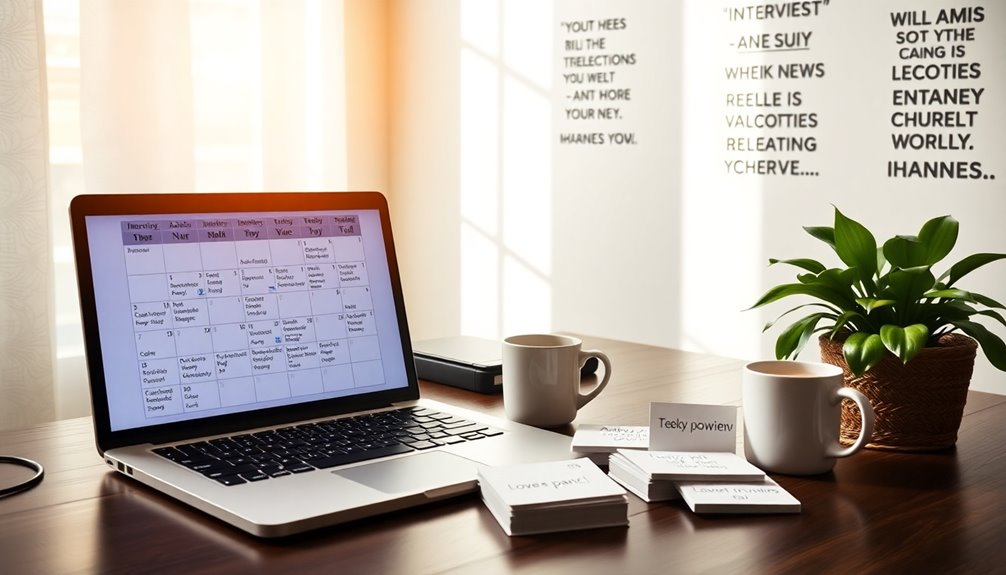Mastering your third interview is essential. This is the stage where you showcase your compatibility with the team and align your experiences with the company's goals. Review your notes from previous interviews to identify key points and concerns. Prepare insightful questions by researching the interviewers. Use the STAR method to navigate behavioral questions effectively, highlighting your adaptability and problem-solving skills. Emphasize your cultural fit through shared values and experiences. Finally, approach salary discussions thoughtfully and follow up promptly to express your enthusiasm. There's so much more you can explore to elevate your performance in this pivotal moment.
Key Takeaways
- Review previous interview notes to address concerns and highlight growth since last discussions.
- Research interviewers' backgrounds to prepare insightful questions and demonstrate engagement.
- Use the STAR method to structure responses for behavioral questions, showcasing problem-solving skills.
- Align personal values with company culture, sharing experiences that demonstrate teamwork and adaptability.
- Follow up with a thank-you email, reinforcing key qualifications and expressing enthusiasm for the opportunity.
Importance of the Third Interview

The third interview serves as a critical juncture in the hiring process, often determining whether you're the right fit for the role and the company culture.
In this final evaluation, hiring managers dig deeper into your compatibility with their team and organizational values. You'll likely interact with senior leadership or a panel, making it essential to showcase your job-related competencies effectively.
This interview not only assesses your skills but also offers you a chance to demonstrate your understanding of the company's dynamics. It's your opportunity to shine, articulate your experiences, and connect your background to the company's goals.
Failing to grasp the significance of this stage could mean missing out on your dream job, so approach it with focus and determination.
Key Preparation Strategies

Preparation is essential for acing your third interview, as it sets the stage for showcasing your qualifications and compatibility with the company.
Start by reviewing notes from your previous interviews to identify key points and areas of concern. Research the backgrounds of your interviewers and prepare insightful questions that show your engagement.
Understand the company's current challenges and how your skills align with their needs. Be ready to address any concerns raised earlier, highlighting your proactive steps to overcome them.
Ultimately, practice discussing relevant experiences that demonstrate your abilities, even if they're indirect. Additionally, consider how budgeting strategies can help you manage any potential relocation or transition costs associated with the new position.
With these strategies, you'll present yourself as a thoughtful, well-prepared candidate ready to contribute effectively to the team.
Navigating Behavioral Questions

Steering through behavioral questions can feel intimidating, but mastering them is essential for your third interview's success. These questions aim to uncover how you've handled various situations in the past, revealing your problem-solving skills and personality traits.
To navigate them effectively, prepare by reflecting on your experiences and structuring your responses clearly.
- Picture yourself managing tight deadlines with a calm demeanor.
- Envision resolving team conflicts while fostering collaboration and trust.
- Recall situations where your adaptability led to successful outcomes.
Focus on the STAR method—Situation, Task, Action, Result—to give clear, concise answers. This approach not only showcases your qualifications but also helps you connect with the interviewers on a deeper level.
Demonstrating Cultural Fit

Understanding how to demonstrate cultural fit is key in your third interview. You want to show that your values align with the company's mission and environment. Be prepared to share experiences that highlight collaboration, adaptability, and your approach to challenges. Additionally, being aware of parenting resources can help you articulate how your personal values influence your professional life.
| Value | Your Experience | Emotional Connection |
|---|---|---|
| Teamwork | Led a project with diverse teams | Sense of belonging and support |
| Innovation | Suggested a new process | Empowerment and creativity |
| Integrity | Resolved a conflict transparently | Trust and reliability |
| Growth Mindset | Embraced feedback for improvement | Openness and continuous learning |
Salary Negotiation Tactics

When it comes to salary negotiation, many candidates feel uncertain about how to approach the conversation. It's important to enter this phase prepared and confident.
Start by researching the average salary for your role, so you know what to expect. Wait for the interviewer to bring up salary to avoid premature discussions. If the offer is lower than expected, don't hesitate to ask about flexibility.
Remember, it's a negotiation, not a demand.
- Picture yourself calmly discussing your worth.
- Imagine confidently presenting your research and expectations.
- Visualize a collaborative conversation, leading to a satisfying agreement. Additionally, consider how your compensation package aligns with retirement savings options available for your financial future.
Effective Follow-Up Communication

An effective follow-up communication can greatly enhance your candidacy after a third interview. Sending a thoughtful thank-you email within 24 hours shows your appreciation for the opportunity and reinforces your interest in the position.
In your message, highlight key qualifications discussed during the interview and mention any points you may have overlooked. This not only reminds the hiring team of your fit for the role but also demonstrates professionalism.
Keep your tone positive and concise, and consider adding a question or two about the next steps in the hiring process. This engages the interviewer and shows your enthusiasm. Additionally, demonstrating self-empowerment through proactive communication can set you apart from other candidates.
Mindset and Professional Conduct

Following up effectively sets a positive tone, but maintaining the right mindset and professional conduct during the third interview is equally important.
You need to approach this stage with confidence and professionalism. Stay engaged, treat everyone with respect, and keep your focus sharp, regardless of how relaxed the atmosphere feels.
- Dress impeccably to reflect your seriousness about the opportunity.
- Listen actively to show you value the input from interviewers.
- Maintain eye contact to convey confidence and sincerity. Additionally, demonstrating strong communication skills can significantly enhance your rapport with the interviewers.
Frequently Asked Questions
What Should I Wear to a Third Interview?
For your third interview, you should opt for professional attire that reflects the company culture. A well-fitted suit or business casual outfit is often a safe bet.
Choose neutral colors and avoid overly flashy accessories. Pay attention to grooming and guarantee your shoes are polished.
If you're unsure, observe what employees wear during your visits or check the company's online presence. Dressing appropriately shows respect and helps make a positive impression on your potential employers.
How Can I Manage Interview Anxiety Effectively?
Did you know about 70% of job seekers experience anxiety before interviews?
To manage your interview anxiety effectively, practice deep breathing techniques to calm your nerves. Visualize success by imagining a positive outcome, and prepare thoroughly to boost your confidence.
Rehearse your answers aloud, and consider mock interviews with friends. Remember, it's okay to pause and gather your thoughts during the interview; it shows you're thoughtful and engaged.
What if I Don't Connect With the Interviewers?
If you don't connect with the interviewers, don't panic. Focus on your qualifications and how they align with the role.
Try to find common ground by asking about their experiences or interests. Body language can help too; maintain eye contact and smile to build rapport.
If you sense a disconnect, adapt your approach. Remember, it's also a chance for you to assess if the company's the right fit for you.
Should I Bring a Portfolio or Work Samples?
You should definitely consider bringing a portfolio or work samples to your interview. They provide tangible evidence of your skills and experience, making a strong impression on interviewers.
Tailor your samples to align with the job requirements, showcasing your best work. This can also spark conversations about your achievements and how they relate to the role.
Just guarantee they're organized and easy to present, demonstrating your professionalism and preparedness for the opportunity.
How Long Should I Expect the Interview to Last?
When you step into that interview room, think of it as entering a dance—timing is everything.
Typically, you should expect the interview to last between 60 to 90 minutes. This window allows you to showcase your skills while the interviewers gauge your fit.
Stay sharp and engaged throughout, as each minute is a chance to shine.
Conclusion
As you step into your third interview, think of it as your grand stage, much like a final act in a play where you showcase your best performance. Embrace the chance to illuminate your strengths and align your vision with the company's goals. With each response, weave your narrative, capturing the essence of your fit. Remember, this isn't just an interview; it's your moment to shine, leaving a resonant echo long after you've walked out the door.









